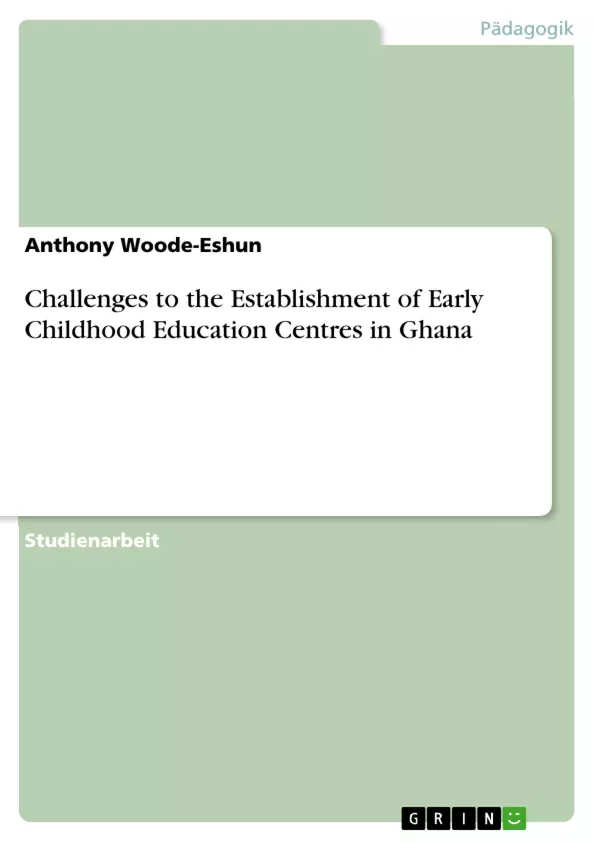Two parties are said to be in a relationship with one another if they impact on each other and if they are interdependent in the sense that a change in a party causes a change in the other and vice versa. In this paper, the two parties are the school and the community. The school finds itself in a community and the community sees the school to be part of them. For a better coexistence, there should be an effective relationship between the school and the community. In this paper, the concept of community participation will be discussed together with some challenges that local communities in Ghana may face in an attempt to contribute to the development of Early Childhood Centres in their respective areas.
Inhaltsverzeichnis
- Introduction
- Concept of Community Participation
- Challenges Faced by Local Communities in Contributing to the Development of Early Childhood Centres in their Respective Areas
- Economic circumstances
- Lack of time
- Strange and strained relationship between teachers and the community members
- Lack of accountability
- Disregard of the community members
- Conclusion
Zielsetzung und Themenschwerpunkte
Diese Arbeit untersucht das Konzept der Gemeindebeteiligung im Kontext der Entwicklung von Kindertagesstätten in Ghana. Der Schwerpunkt liegt auf der Analyse der Herausforderungen, denen lokale Gemeinschaften im Rahmen ihrer Bemühungen zur Unterstützung von Frühkindereinrichtungen gegenüberstehen.
- Definition und Bedeutung der Gemeindebeteiligung
- Herausforderungen, die lokale Gemeinschaften in Ghana bei der Unterstützung von Kindertagesstätten erleben
- Der Einfluss von wirtschaftlichen Faktoren auf die Gemeindebeteiligung
- Die Rolle der Beziehungen zwischen Lehrkräften und Gemeindemitgliedern für die erfolgreiche Zusammenarbeit
- Die Bedeutung von Transparenz und Rechenschaftspflicht in Bezug auf die Verwendung von Gemeindemitteln
Zusammenfassung der Kapitel
Die Einleitung stellt den Rahmen der Arbeit vor und definiert die Schlüsselbegriffe "Schule" und "Gemeinschaft". Das Konzept der Gemeindebeteiligung wird als ein Prozess beschrieben, der die Mobilisierung von Ressourcen und die Mitwirkung von Gemeindemitgliedern bei der Entwicklung von Aktivitäten und Entscheidungsfindung beinhaltet.
Der Abschnitt "Challenges Faced by Local Communities in Contributing to the Development of Early Childhood Centres in their Respective Areas" beleuchtet die Schwierigkeiten, denen lokale Gemeinschaften in Ghana bei der Unterstützung von Kindertagesstätten begegnen. Dazu gehören wirtschaftliche Einschränkungen, Zeitmangel, gestörte Beziehungen zwischen Lehrkräften und Gemeindemitgliedern sowie mangelnde Rechenschaftspflicht.
Schlüsselwörter
Die Arbeit behandelt die Themen Gemeindebeteiligung, Frühkindliche Bildung, Herausforderungen der Gemeindeentwicklung, wirtschaftliche Faktoren, Lehrer-Gemeinde-Beziehungen, Rechenschaftspflicht und Transparenz.
Häufig gestellte Fragen
Was bedeutet Gemeindebeteiligung im ghanaischen Schulwesen?
Es handelt sich um einen Prozess, bei dem lokale Gemeinschaften Ressourcen mobilisieren und aktiv an Entscheidungen und Aktivitäten zur Entwicklung von Kindertagesstätten teilnehmen.
Welche wirtschaftlichen Faktoren behindern die Entwicklung von Kitas in Ghana?
Die ökonomische Lage vieler Haushalte schränkt die finanzielle Unterstützung für Bildungseinrichtungen stark ein, was ein großes Hindernis für den Aufbau von Frühkindereinrichtungen darstellt.
Warum ist das Verhältnis zwischen Lehrern und der Gemeinde oft problematisch?
Oft bestehen Spannungen oder ein Mangel an Kommunikation, was die Zusammenarbeit erschwert. Ein respektvoller Umgang ist jedoch Voraussetzung für eine erfolgreiche Beteiligung.
Welche Rolle spielt die Rechenschaftspflicht?
Mangelnde Transparenz bei der Verwendung von Gemeindemitteln führt oft dazu, dass sich Gemeindemitglieder zurückziehen. Rechenschaftspflicht ist daher essenziell für langfristiges Engagement.
Gibt es zeitliche Barrieren für die Beteiligung?
Ja, viele Gemeindemitglieder haben aufgrund ihrer eigenen Arbeit und Lebensumstände kaum Zeit, sich aktiv in Schulprojekten zu engagieren.
- Quote paper
- Anthony Woode-Eshun (Author), 2021, Challenges to the Establishment of Early Childhood Education Centres in Ghana, Munich, GRIN Verlag, https://www.grin.com/document/1153668



